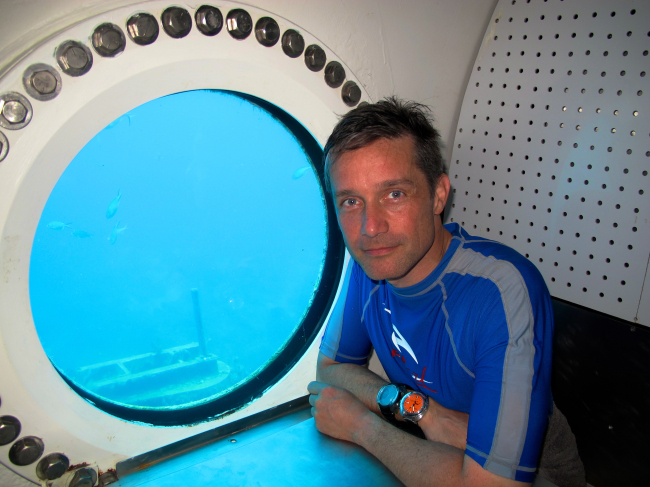ISLAMORADA, Florida (AP) ― Like viewers worldwide, Fabien Cousteau was entranced by his famous grandfather’s films about marine life and human exploration underwater. Now he’s adding to his family’s sea stories with a 31-day underwater expedition in the Florida Keys.
Cousteau dove Sunday to Aquarius Reef Base, a school bus-sized laboratory 18 meters below the ocean’s surface, a few kilometers off Key Largo. He plans to spend more than a month living underwater with a five-person crew, making a documentary and leading science experiments on the nearby coral reef.
Before their boat left an Islamorada dock Sunday morning, Cousteau and his crew said they would miss seeing the sun for more than month, but they weren’t nervous about being isolated in the undersea lab.
Cousteau dove Sunday to Aquarius Reef Base, a school bus-sized laboratory 18 meters below the ocean’s surface, a few kilometers off Key Largo. He plans to spend more than a month living underwater with a five-person crew, making a documentary and leading science experiments on the nearby coral reef.
Before their boat left an Islamorada dock Sunday morning, Cousteau and his crew said they would miss seeing the sun for more than month, but they weren’t nervous about being isolated in the undersea lab.

“I imagine we’ll want to stay down once we get comfy down there,” Cousteau said. “We won’t want to come back up to the surface because it’s such a magical place.”
The idea for “Mission 31” came to Cousteau two years ago when he visited Aquarius during a fundraising push to save the lab, which federal budget cuts had threatened to permanently close.
“It reminded me that I’ve always wanted to live underwater,” Cousteau said Saturday at his training base in Islamorada.
“Mission 31” builds on the legacy of Conshelf II, the 30-day underwater living experiment in the Red Sea that Jacques Cousteau filmed in 1963 for his Oscar-winning documentary “World Without Sun.”
The younger Cousteau can do something his grandfather could not: broadcast the entire adventure live online and communicate with the public through social media and video chats with classrooms on land.
“For the first time I’m able to invite the world on a Cousteau expedition in real time,” said Cousteau, who has filmed documentaries on sharks and other marine life.
Jacques Cousteau was revered worldwide for exploring the ocean in a multitude of documentaries and books, as well as for pioneering the advanced scuba diving techniques used at Aquarius. While he developed underwater living experiments out of the belief that an overpopulated world might drive humans to live in the oceans, interest in the habitats waned through the decades until Aquarius was the last underwater research lab.
His grandson believes interest in the oceans is reviving as climate change threatens to disrupt life on land.
“Whether you care about economics, in your personal life or your business life, whether you care about your health or your child’s health, whether you care about saving creatures, it all pertains to making sure that our oceans are healthy. And our oceans are not,” Cousteau said.
Throughout the expedition, Florida International University and Northeastern University researchers will study the effects of climate change and pollution on the coral reef.
The crew will experiment with new technology that uses sonar to create 3-D video images, allowing them to gather data and footage without lights that would disrupt the fish.
-
Articles by Korea Herald



![[AtoZ into Korean mind] Humor in Korea: Navigating the line between what's funny and not](http://res.heraldm.com/phpwas/restmb_idxmake.php?idx=644&simg=/content/image/2024/04/22/20240422050642_0.jpg&u=)
![[Exclusive] Korean military set to ban iPhones over 'security' concerns](http://res.heraldm.com/phpwas/restmb_idxmake.php?idx=644&simg=/content/image/2024/04/23/20240423050599_0.jpg&u=20240423183955)



![[Graphic News] 77% of young Koreans still financially dependent](http://res.heraldm.com/phpwas/restmb_idxmake.php?idx=644&simg=/content/image/2024/04/22/20240422050762_0.gif&u=)
![[Herald Interview] Why Toss invited hackers to penetrate its system](http://res.heraldm.com/phpwas/restmb_idxmake.php?idx=644&simg=/content/image/2024/04/22/20240422050569_0.jpg&u=20240422150649)






![[Exclusive] Korean military to ban iPhones over security issues](http://res.heraldm.com/phpwas/restmb_idxmake.php?idx=652&simg=/content/image/2024/04/23/20240423050599_0.jpg&u=20240423183955)



![[Today’s K-pop] Ateez confirms US tour details](http://res.heraldm.com/phpwas/restmb_idxmake.php?idx=642&simg=/content/image/2024/04/23/20240423050700_0.jpg&u=)